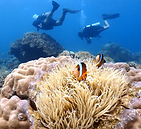
Coral ecology & identification L2
Often mistaken for rocks, corals are these fascinatingly small animals that create the foundation of complex underwater ecosystems. Learn more about them, their different types in our coral ecology modules. The first level will teach you about coral ecology, recognize the different types and understand growth form and resilience status. This follow up training – level 2 class – is for more advanced students who completed level 1 training and would like to learn basics of coral taxonomy and coral genus.
Standards
-
Get a closer look at coral polyps and advanced knowledge of the rich diversity of corals in the Philippines.
-
Learn about coral taxonomy and get introduced to coral identification at genus level for 10 of the most common local coral genera
-
Discuss about coral resilience, roles and functions
-
Observe them in their habitats, practice your identification skills and learn interesting facts about them.
Inclusions
-
1 classroom session to teach about ecology and conservation of coral reef ecosystems
-
2 identification scuba dives with an instructor (or guided snorkeling / free diving sessions) to complement classroom session and develop identification skills of marine organisms.
-
Dive / snorkeling equipment is included along with marine fee
-
Vegetarian lunch & snacks

SCUBA DIVING
(Recommended)

SNORKELING / FREE DIVING
Choose your format
Pre-requirements
Scuba Diving format
-
An open water certification (PADI, SSI, RAID, CMAS, etc.) is required*.
-
and a minimum of 30 dives including at least 1 this year OR a buoyancy training (2 dives) with CRCP done this year*.
Snorkeling format :
-
Ability to swim comfortably (without swimming aid)
-
and Previous experience with a mask, snorkel and fins are required*.
* (You do not fit the requirements? No worries, have a look in the scuba training section, or just contact us for advices.)

Why these requirements?
During the course, you will be learning about small fragile marine organisms and be needing to come very close from them. For your safety (some may sting) and theirs, it is important that you master good buoyancy control and precision of your movements in the water before we do so. This will also make scuba diving much more efficient and enjoyable for you. If you need, we are happy to provide such training ahead of the program.
Timelines & dates
This class is usually a 1 day session from 8 am to 3 pm with classroom session in the morning followed by in water session to complement the theory.
Classes are available any day upon request + confirmed booking.
Start time can vary so double check on the specific date you are interested to book. To insure availabilities, we require you inquire and reserve your slot with a few week's notice.
Class participation fee
The standard fee for this course are listed below and includes all theory, 2 dives, marine fees and dive/snorkeling equipment. It also includes vegetarian lunch and snacks.
-
Class fee while snorkeling : 3,500 PHP
-
Class fee on a scuba diving format : 5,400PHP
Are you Filipino? You may avail an automatic 20% discount on our programs.
Feel free to inquire if you wish to include additional dive training into the course, we are happy to adapt to your personal goals.
By taking this course, you support conservation
LearnwithCRCP is the education platform of CRCP, a fully registered non-stock non-profit NGO in the Philippines, this means that aside from the raw cost of any of our training programs, all remaining balance is used to fund our marine and terrestrial conservation projects. By participating in one of our training program, you are directly supporting environmental conservation. Read more about us and the work that we do by visiting our full website linked below.